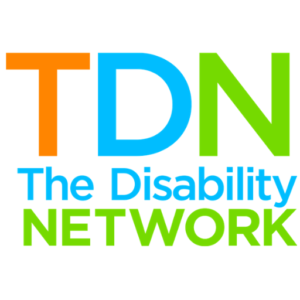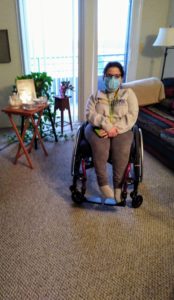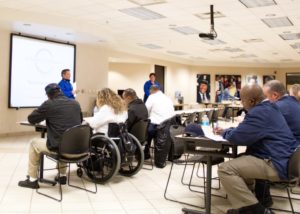By Madeleine Graham
Even within the constraints of the COVID-19 pandemic, Genesee County’s Disability Network (TDN) is continuing to provide services to the county’s disabled population.
That includes creating Zoom substitute activities for high school participants, keeping in contact with nursing homes to provide a path to greater independence for some people with disabilities, and continuing to write grants to support clients’ needs–all while employees are working remotely.

The Disability Network logo
Headquartered in the Dort Mall at 3600 Dort Hwy, the 30-year-old Disability Network is what’s called a Center for Independence, an official designation. According to The National Council on Independent Living, Centers for Independent Living (CIL) are community-based, cross-disability, non-profit organizations designed and operated by people with disabilities.
CILs are unique in that they operate according to a strict philosophy of consumer control, wherein people with all types of disabilities directly govern and staff the organization.
About Independent Living (ncil.org)
The history of the Disability Network begins in 1992 as an idea or inspiration when several people with disabilities in Genesee County were invited to a “Handicap Alliance Services Support Meeting,” attended by 50 people. Of all those in the room, only two had visible disabilities: Mike Zelley and Mike Fosler.
“The rest were all service providers in Genesee County with the best intentions for people with disabilities, but they realized that independent philosophy of nothing about us without us,” explained Luke Zelley, president of TDN and son of one of the original founders, Mike Zelley.
People with disabilities need to be actively involved and at the table when decisions are being made, Luke Zelley explained. Thus, The Disability Network is a non-profit that is governed and led by people with disabilities. So, following that first meeting, “Eight advocates met to solve world problems, and they found federal funding for Centers for Independent Living,” Zelley said.
The company started by becoming a Center for Independent Living under federal funding and in 1994, The Disability Network officially formed. TDN offers nursing facility transition by actively working with nursing homes to move as many clients as they can to their homes or apartments.
Former U.S. Congressman Dale Kildee, uncle of current Representative Dan Kildee, fought for and co-sponsored legislation titled the “Money Follows The Person Act of 2005,” which authorized the Secretary of Health and Human Services to issue grants to states to move Medicaid individuals from long-term services such as nursing homes to a place of their choice. The federal level funding went away and it is now a Medicaid-eligible program, stated Zelley.
That funding can be used for furniture, appliances, rent, and other wrap-around supports to live independently. Recently, TDN secured a grant in the amount of $18,000 for ramps, for individuals needing the ramps for accessibility under the Federal Cares Act.
Every month in light of COVID-19, TDN calls nursing homes to see who may be eligible to move to a community of their choosing otherwise TDN workers would visit the facilities. The social workers and people at nursing homes want to get people independent by calling us, Zelley explained.

Photo source: The Disability Network website
Very specifically because Centers for Independent Living is a community of choice, if somebody is in a group home, TDN will try to help whether Medicaid eligible or not. “It is a struggle when there is not funding, but we don’t let that get in the way,” Zelley indicated. The primary focus, however, he said, is transitioning from nursing homes.
The TDN has two “youth ambassadors” who work with local schools to gain independence and who assist in transitioning after high school. Peer support is offered with life skills and self advocacy.
“What does life look like after high school? Last year, TDN worked with 150 students; however, this year due to COVID-19 only 98 students participated.” Zelley stated. TDN partners with MI Works. Students are eligible through age 26.
“We don’t have designated programs for students who age out; however, TDN offers art programs and kayaking,” he said.
Jessica Dixon is a TDN peer counselor and advocate. Luke Zelley said Dixon can step in when emotional support is needed such as arranging emotional support animals or practical support such as assuring parking lot accessibility. She encourages advocating and self-advocacy.
Another TDN staffer, Besh Aanakwad, is Native American and goes by Besh for short. “ My reservation and my tribe’s name is the Lac Courte Oreilles Lake Superior Band of Chippewa Indians,” Besh explained. He is in charge of the computer room at TDN where classes had been held prior to COVID-19. TDN is in the process of determining how the computer room will be used as the pandemic continues its challenges, he said.

Cida O’Briant. (Photo by Madeleine Graham)
Cida O’Briant, a volunteer, is a native of Brazil brought to the U.S. at age four. She lived in an orphanage until age 13, when she was adopted. O’Briant assists in the computer room, but has not been able to perform her duties because of COVID-19. In fact, all regular employees are currently working remotely while volunteers remain unable to do work due to the pandemic.
Not being able to volunteer in person during the pandemic has been difficult, O’Briant acknowledged. She misses those she works with. Her normal duties include turning on the computers, login of people using computers, writing down what time the person came in to use computers and what time they left, as well as, getting paper for printers and filling the printers when needed.
O’Briant said it was great to work with Besh.”He takes care of problems,” she explained. Microsoft Word, Power Point and Excel are some of the programs O’Briant uses. TDN relies heavily on volunteers for events, such as, the Flint Art Walk and kayaking, Zelley said. With the office being run remotely during the coronavirus, TDN has held several Zoom conferences providing opportunities to participate virtually, such as, when TDN hosted a magician or offering peer support groups.
How does TDN advise to engage with people who have disabilities?
Noting that some people feel uncomfortable talking to disabled people, Zelley mentioned it is not just a local problem but a worldwide one. He cited a United Kingdom study in which 67 percent of the British public reported feeling uncomfortable talking to people with disabilities.

(Photo source: The Disability Network website)
TDN tries to combat the unconscious bias, he said.
Proactive steps are important so bias does not impact treatment of a person, Zelley said, suggesting that able-bodied people reach out to people with disabilities, with the objective of seeing the individual as a person.
For example, Back to the Bricks levels the playing field. Bruce Chargo, TDN Board Chair is quadriplegic, but has a muscle car and people engage with him about the car. People with disabilities have families, spouses, careers, children. As interactions take place, individuals see each other as human and bias goes away, Zelley stated.
When it comes to bias, race is always number one, with disability coming in second, Zelley said.
Under executive order of the governor, health care providers as well as law enforcement personnel must have Implicit Bias Training or Unconscious Bias Training relevant to people with disabilities, Zelley explained. The phone number for TDN is (810) 742-1800 ,Caption Call: (810) 742-7647 and the website in The Disability Network | (disnetwork.org)
EVM staff writer Madeleine Graham can be reached at madeleine4841@gmail.com.


You must be logged in to post a comment.